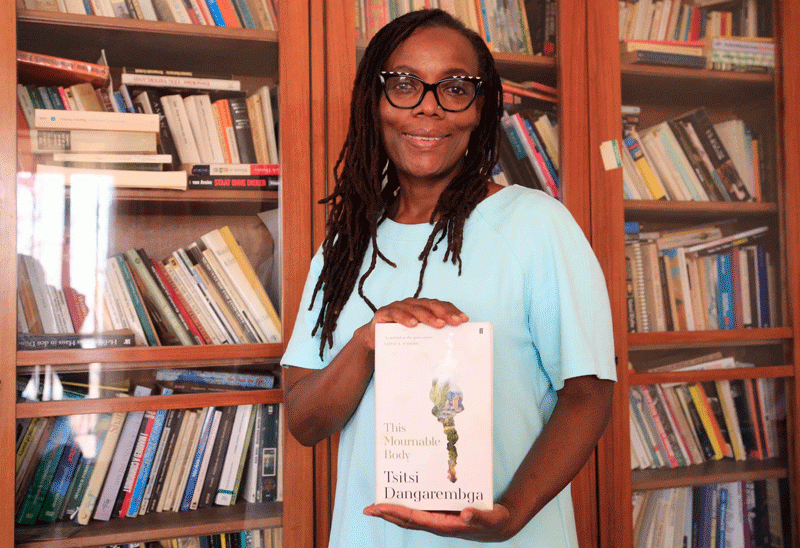
TSITSI Dangarembga is now arguably Zimbabwe’s most celebrated writer, garnering international recognition for her thought-provoking works as a novelist, filmmaker and social activist.
With an impressive string of prestigious awards to her name, Dangarembga has solidified her position as a leading literary voice from Zimbabwe, resonating with audiences worldwide.
Last Wednesday, she was conferred with an honorary Doctorate of Literature (D Litt Honoris Causa) by one of South Africa’s oldest and most renowned academic institutions, Rhodes University.
Founded in 1904, Rhodes University has a well-established reputation for academic excellence and an enrolment of over 8 000 students.
“I am deeply appreciative of the honour Rhodes University has bestowed on me,” she told IndependentXtra.
“Their recognition of my work points to a larger understanding of the importance of free creative expression for Africa’s recovery from past and present colonialist influences. I am always doubly grateful for recognition from my continent. Rhodes University yandiita munhu (the university has fulfilled me).”
Other Zimbabwean writers who have received international acclaim include Doris Lessing, a Nobel Prize in Literature laureate for The Golden Notebook (1962), renowned for her prolific output of over 50 books before her death in 2013.
She is also famed for The Grass is Singing (1950), which explores the fraught relationship between a white farmer’s wife and her black servant.
- Tsitsi Dangarembga, charged with inciting public violence, 28 hearings in two years
- Women tell own stories through film fest
- IIFF partners German women’s film festival
- Letters: Dangarembga’s conviction is a ‘travesty of justice’
Keep Reading
The late Dambudzo Marechera, whose The House of Hunger (1978) won the Guardian Fiction Prize in 1979, remains a subject of literary discussion and study.
Marechera died in 1987 at just 35.
Shimmer Chinodya is another notable figure, winning the Commonwealth Writers’ Prize (Africa Region) in 1990 for Harvest of Thorns (1989). He later received the Zimbabwe Writers’ Award (1990) and the Ragdale Fellowship (1993).
His works include Dew in the Morning (1982), Farai’s Girls (1984), Tale of Tamari (2004), and Chairman of Fools (2005), among others, including school textbooks.
In her acceptance speech for the honorary doctorate, Dangarembga recounted her “traumatic” journey — from the rejection of her Nervous Conditions manuscript by “patriarchal” Zimbabwean exiles in the UK, to enrolling at a German film school, and finally seeing Nervous Conditions published in 1988.
“Patriarchy stood against my narrative-making. Capital stood against my work too. What was I to do? I did not stop. I studied another means of making narrative,” she said in her speech, aptly titled What if We Don’t Stop?
“I came to realise that melanated people’s agency was actively proscribed in film narrative. Once more, I faced the question: do I continue, or do I stop? Understanding the narrative and industrial ways in which film erases the agency of melanated people became the foundation of my intellectual thought on cinematic representation and subjectivity.”
She added: “I have now moved on to examining Zimbabwean subjectivities and their evolution over time. Not stopping has led me to reconsider ubuntu, culminating in my concept of a contemporary Ubuntu 2.0.”
Dangarembga has won numerous global awards, with two of her books becoming bestsellers in Germany.
Several have been translated into foreign languages, including Shona editions of Nervous Conditions (Hakuna Zvakadaro) and The Book of Not (Kusagadzikana) last year.
Nervous Conditions and This Mournable Body were translated into German in 2019 as Ausbrechen and Überleben, respectively, alongside The Book of Not and Black and Female. She also became the first black woman to receive the prestigious Peace Prize of the German Book Trade.
Nervous Conditions, published in the UK, was the first English-language novel by a black Zimbabwean woman. It was named among the BBC’s 100 Books That Changed the World (2018) and won the Commonwealth Writers’ Prize (1989).
Its sequel, The Book of Not (2006), was followed by This Mournable Body (2018), shortlisted for the 2022 Booker Prize — the UK’s most prestigious literary award, open to English-language novels by authors of any nationality.
In November 2023, Dangarembga was awarded the Alice and Clifford Spendlove Prize in Social Justice, Diplomacy, and Tolerance by the University of California, Merced. She is the 16th recipient, joining figures such as former US President Jimmy Carter, poet Peter Balakian, and Black Lives Matter co-founder Alicia Garza.
The prize was established in 2005 by Sherrie Spendlove in honour of her parents, who dedicated their lives to serving Merced’s community.
In 2022, the Financial Times named her among the 25 Most Influential Women of 2022, alongside figures such as US Supreme Court Justice Ketanji Brown Jackson, Colombian Vice-President Francia Márquez Mina, and Meghan Markle.
Dangarembga also won the PEN Pinter Prize and PEN International Award for Freedom of Expression (2021), honouring writers who champion free speech despite political persecution. Past winners include Laureate Svetlana Alexievich, Palestinian poet Dareen Tatour, and Ugandan academic and poet Stella Nyanzi.
The award recognises not only her literary contributions but also her activism. In 2020, she was arrested for protesting government corruption, drawing widespread condemnation.
In 2022, she received the Windham-Campbell Literature Prize for fiction and was invited to contribute to Norway’s Future Library — a century-long art project where manuscripts will remain unpublished until 2114.
Every year since 2014, Scottish artist Katie Paterson – along with her Norwegian counterpart Anne Beate Hovind and a group of trustees – has invited Dangarembga to submit a manuscript until 2113.
Then, a century after the project began; they will all finally be published.
Forbidden from revealing the content of their work, writers can only share the titles. Dangarembga named hers Narini and Her Donkey.
“Narini” derives from a Shona word denoting “infinity”.
All the manuscripts will be stored for almost a century inside locked glass drawers in a hidden corner of Oslo’s main public library, within a small, wooden repository called the Silent Room. In 2114, the drawers will be unlocked – and 100 stories hidden for a century will finally be published in one go.
Beyond writing, Dangarembga wrote the screenplay for Zimbabwe’s iconic film Neria (1991). Her directorial debut, Everyone’s Child (1996), won awards at the Dublin International Film Festival.
She founded the production company Nyerai Films, the International Images Film Festival for Women, and the Institute of Creative Arts for Progress in Africa, where she serves as director.











